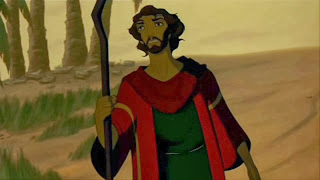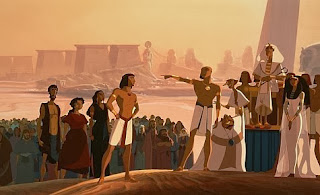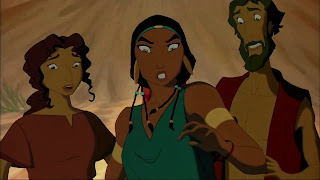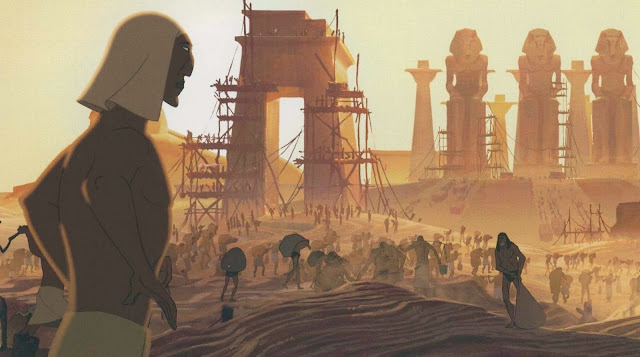You know, at some point I promise I'll write about a movie I don't love unconditionally for this segment (probably starting next week, actually - I'm eyeing you, Pocohontas), but for this week, let's delve deeply back into my little corner of nostalgia, shall we?
Prince of Egypt is an animated film, ostensibly made for children, that does an amazing job of telling the Judeo-Christian story of Moses and his leadership over the Israelites as they walked out of Egypt and into the Promised Land. Most of you probably know the story at least a little bit. The Israelites were slaves in Egypt for hundreds of years, until God called upon Moses, a Hebrew who had been raised in the Pharaoh's own house then cast out into exile, to come before Pharaoh and tell him to let the Israelites go. Understandably, Pharaoh refused, and God rained down ten plagues of grossness upon the people of Egypt until Pharaoh relented.
And then the Israelites, who were exceptionally human, proceeded to complain about their living conditions in the desert and suggest going back to Egypt. Oh, and build idols to gods other than the one that got them out of Egypt, and bitch at Moses, and generally kind of suck. Like people do.
That part isn't in the movie, though it does appear in the even less kid-friendly The Ten Commandments, but the rest of the film is pretty spot on with the accepted accounts. This makes sense, as the film Prince of Egypt was actually created as a semi-vanity project by director Stephen Spielburg, an attempt to entertain and educate people about the basic tenets of historical Judaism (and, by extension, Christianity). Also, it's a good movie.
Not a particularly kid friendly film, however, and that's what I want to focus on here. Because while we in America would see a lot of things about this movie that are "objectionable" when you consider its intended audience, in reality, they're kind of not all that bad. It's just that we have a weird tendency over here to coddle our young, and this film really flies in the face of that. But more on that later.
Prince of Egypt, like I said, is about the story of Moses. And not just Moses as high priest and prophet of Israel, the film is about Moses the man. Who he was and how he became the one to lead Israel. It starts with baby Moses being smuggled away from Pharaoh's guards, as the time had come for a population quell. The guards were to kill every child under the age of two or so that the Hebrews did not become "too numerous". And Moses' mom has a pretty reasonable desire to spare her son this fate. So she sticks him in a basket, prays hard, and sends him off down the river. (All to a kicking musical soundtrack, it should be noted. The music in this film is amazing.)
Moses' basket washes up on the steps of Pharaoh's palace and is picked up by none other than Pharaoh's wife (Helen Mirren), who figures, eh, what the hell, now she has another son. And so Moses is raised in the Pharaoh's household as one of his own sons.
The movie then skips forward to show us Moses as a young man, now voiced by Val Kilmer. He and Rameses (Ralph Fiennes) are fun, playful men who love to race their chariots, play practical jokes on the priests, and generally cause havoc. Their father, Seti (Patrick Stewart), despairs of both of them and seeks to instill in them a sense of responsibility, to varying degrees of success. Moses isn't such a bad guy, just a privileged kid who needs to work some stuff out, as we find when he helps a slave girl (Tzipporah, voiced by Michelle Pfieffer) to escape. But in that same scene he runs into Miriam (Sandra Bullock) and Aaron (Jeff Goldblum), his birth siblings. They recognize him and Miriam calls him out on their relationship. Moses goes home with a massive identity crisis looming.
Said crisis hits full on when he asks his father point blank for the truth, and Seti confirms it. Not only is Moses definitely adopted, he's the only survivor of the Hebrew slaughter. Understandably, this throws him for a hell of a loop and a finds himself reeling with no idea what to do. And in short order he manages to act out so much he gets his butt exiled. Into the desert. For speaking against Pharaoh in support of a slave.
Moses goes out into the desert, nearly dies in a sandstorm, and finds himself at a watering hole sticking his head in the trough next to a group of sheep, then saving a couple of girls from some bandits, and falling into a well, only to be saved by - wait for it - Tzipporah! Her family takes him in, against her intense desires, and romance very slowly blooms. They get married. They're happy. And then God comes knocking.
Or rather, he comes in a burning bush and totally blows Moses head away. Moses is given a holy mission - go to Egypt and tell Pharaoh to let the Hebrews go. It's total suicide, and Moses is absolutely going to do it. Tzipporah isn't about to let her husband get himself killed, so she comes along. And it's back to Egypt we go.
Rameses, now Pharaoh, gives Moses a great welcome home. That is, until Moses drops the whole "Free all of your slaves right now or else," bombshell. Then it's on. Rameses isn't budging, and neither is Moses, and what follows is depressing and horrifying and important. The plagues fall. People die. Lots of people. And finally, Pharaoh frees his slaves.
Only to change his mind and chase after them, prompting the race through the Red Sea (and the accompanying parting thereof) and the utter devastation of Pharaoh's army. But really, the story is mostly over when Pharaoh frees his slaves. Why? Because that's when Moses' character development is really done. He's done the thing God commanded him to do, he's lived up to the position of privilege he was given, and he's changed the world for the better. So yay on him.
It's a beautiful movie, in all the senses of the word. The visuals are stunning, the music is amazing, and the voice acting is some of the best I've heard. The story is wonderful, even if I am a little bit biased. And it's just the kind of movie that needs to exist. Hell, it even passes the Bechdel Test and the Race Test. So, you know, win!
But.
It's not very happy, is it? This is a film about systematic injustice, oppression, slavery, mass death, and war. It's about families turning against each other, about God asking men to do things that are essentially suicidal, about choosing some higher cause over that of your own safety. It's about sacrifice and bravery and did I mention that there's a lot of death? There's whipping and murder and sorcery and rivers of blood. It's not a happy story.
Which is precisely why it should be a kids movie. Hear me out. This is not a happy story, and it was never supposed to be a happy story. We don't tell the story of Moses and the Israelites in order to have a nice moment about how God made everything okay and nothing was ever bad again. That would completely miss the point. The point of the story is that sometimes even doing the right thing is hard, and difficult, and painful. That doesn't make it the wrong thing to do. And sometimes the people you're saving suck. Sometimes the person saving you is a complete schmo who doesn't know what he's doing. Sometimes you're completely relying on God because you're stuck between a crazy army and an ocean and you can't swim. Sometimes life is not happy.
Scratch that. Life is never as easy as they make it seem on TV. And that's not a bad thing. We seem to think it is, but it isn't. If life were that easy, the kind of easy where nothing ever really hurts and there is no sadness or tears, then nothing would ever really pierce our hearts in joy either. We need both, at least for now.
So, why is this an important movie for kids to see? Precisely because it's bloody and sad and full of death and killing. It's not a happy story, and it's important for kids to know that not every story is full of sweetness and light. It's honest. And scary, and true.
I, for one, would much rather that my kids grow up knowing that than that they grow up believing that if they wish hard enough they'll get superpowers and be able to race in the Indy 500 without a car. Just saying.
Prince of Egypt is an animated film, ostensibly made for children, that does an amazing job of telling the Judeo-Christian story of Moses and his leadership over the Israelites as they walked out of Egypt and into the Promised Land. Most of you probably know the story at least a little bit. The Israelites were slaves in Egypt for hundreds of years, until God called upon Moses, a Hebrew who had been raised in the Pharaoh's own house then cast out into exile, to come before Pharaoh and tell him to let the Israelites go. Understandably, Pharaoh refused, and God rained down ten plagues of grossness upon the people of Egypt until Pharaoh relented.
And then the Israelites, who were exceptionally human, proceeded to complain about their living conditions in the desert and suggest going back to Egypt. Oh, and build idols to gods other than the one that got them out of Egypt, and bitch at Moses, and generally kind of suck. Like people do.
That part isn't in the movie, though it does appear in the even less kid-friendly The Ten Commandments, but the rest of the film is pretty spot on with the accepted accounts. This makes sense, as the film Prince of Egypt was actually created as a semi-vanity project by director Stephen Spielburg, an attempt to entertain and educate people about the basic tenets of historical Judaism (and, by extension, Christianity). Also, it's a good movie.
Not a particularly kid friendly film, however, and that's what I want to focus on here. Because while we in America would see a lot of things about this movie that are "objectionable" when you consider its intended audience, in reality, they're kind of not all that bad. It's just that we have a weird tendency over here to coddle our young, and this film really flies in the face of that. But more on that later.
Prince of Egypt, like I said, is about the story of Moses. And not just Moses as high priest and prophet of Israel, the film is about Moses the man. Who he was and how he became the one to lead Israel. It starts with baby Moses being smuggled away from Pharaoh's guards, as the time had come for a population quell. The guards were to kill every child under the age of two or so that the Hebrews did not become "too numerous". And Moses' mom has a pretty reasonable desire to spare her son this fate. So she sticks him in a basket, prays hard, and sends him off down the river. (All to a kicking musical soundtrack, it should be noted. The music in this film is amazing.)
Moses' basket washes up on the steps of Pharaoh's palace and is picked up by none other than Pharaoh's wife (Helen Mirren), who figures, eh, what the hell, now she has another son. And so Moses is raised in the Pharaoh's household as one of his own sons.
The movie then skips forward to show us Moses as a young man, now voiced by Val Kilmer. He and Rameses (Ralph Fiennes) are fun, playful men who love to race their chariots, play practical jokes on the priests, and generally cause havoc. Their father, Seti (Patrick Stewart), despairs of both of them and seeks to instill in them a sense of responsibility, to varying degrees of success. Moses isn't such a bad guy, just a privileged kid who needs to work some stuff out, as we find when he helps a slave girl (Tzipporah, voiced by Michelle Pfieffer) to escape. But in that same scene he runs into Miriam (Sandra Bullock) and Aaron (Jeff Goldblum), his birth siblings. They recognize him and Miriam calls him out on their relationship. Moses goes home with a massive identity crisis looming.
Moses goes out into the desert, nearly dies in a sandstorm, and finds himself at a watering hole sticking his head in the trough next to a group of sheep, then saving a couple of girls from some bandits, and falling into a well, only to be saved by - wait for it - Tzipporah! Her family takes him in, against her intense desires, and romance very slowly blooms. They get married. They're happy. And then God comes knocking.
Or rather, he comes in a burning bush and totally blows Moses head away. Moses is given a holy mission - go to Egypt and tell Pharaoh to let the Hebrews go. It's total suicide, and Moses is absolutely going to do it. Tzipporah isn't about to let her husband get himself killed, so she comes along. And it's back to Egypt we go.
Rameses, now Pharaoh, gives Moses a great welcome home. That is, until Moses drops the whole "Free all of your slaves right now or else," bombshell. Then it's on. Rameses isn't budging, and neither is Moses, and what follows is depressing and horrifying and important. The plagues fall. People die. Lots of people. And finally, Pharaoh frees his slaves.
Only to change his mind and chase after them, prompting the race through the Red Sea (and the accompanying parting thereof) and the utter devastation of Pharaoh's army. But really, the story is mostly over when Pharaoh frees his slaves. Why? Because that's when Moses' character development is really done. He's done the thing God commanded him to do, he's lived up to the position of privilege he was given, and he's changed the world for the better. So yay on him.
It's a beautiful movie, in all the senses of the word. The visuals are stunning, the music is amazing, and the voice acting is some of the best I've heard. The story is wonderful, even if I am a little bit biased. And it's just the kind of movie that needs to exist. Hell, it even passes the Bechdel Test and the Race Test. So, you know, win!
But.
It's not very happy, is it? This is a film about systematic injustice, oppression, slavery, mass death, and war. It's about families turning against each other, about God asking men to do things that are essentially suicidal, about choosing some higher cause over that of your own safety. It's about sacrifice and bravery and did I mention that there's a lot of death? There's whipping and murder and sorcery and rivers of blood. It's not a happy story.
Which is precisely why it should be a kids movie. Hear me out. This is not a happy story, and it was never supposed to be a happy story. We don't tell the story of Moses and the Israelites in order to have a nice moment about how God made everything okay and nothing was ever bad again. That would completely miss the point. The point of the story is that sometimes even doing the right thing is hard, and difficult, and painful. That doesn't make it the wrong thing to do. And sometimes the people you're saving suck. Sometimes the person saving you is a complete schmo who doesn't know what he's doing. Sometimes you're completely relying on God because you're stuck between a crazy army and an ocean and you can't swim. Sometimes life is not happy.
Scratch that. Life is never as easy as they make it seem on TV. And that's not a bad thing. We seem to think it is, but it isn't. If life were that easy, the kind of easy where nothing ever really hurts and there is no sadness or tears, then nothing would ever really pierce our hearts in joy either. We need both, at least for now.
So, why is this an important movie for kids to see? Precisely because it's bloody and sad and full of death and killing. It's not a happy story, and it's important for kids to know that not every story is full of sweetness and light. It's honest. And scary, and true.
I, for one, would much rather that my kids grow up knowing that than that they grow up believing that if they wish hard enough they'll get superpowers and be able to race in the Indy 500 without a car. Just saying.







No comments:
Post a Comment